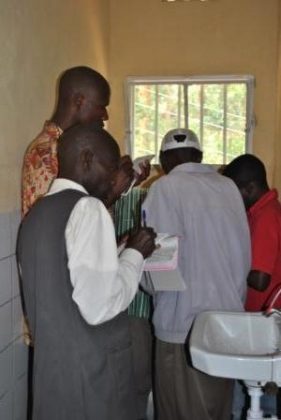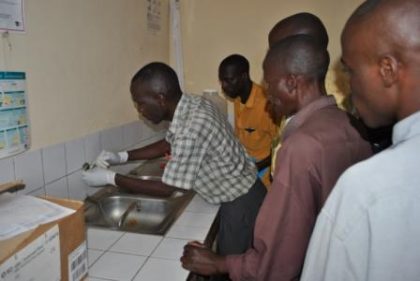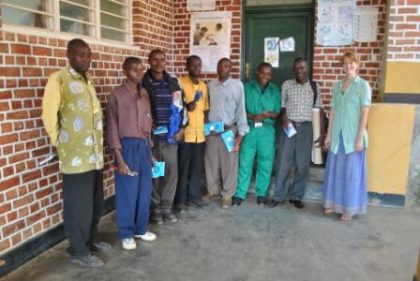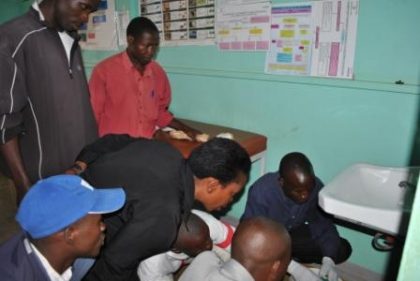 This project has been completed under the direction of Peace Corps Volunteer Kitty Hall. To read about the beginning of the project, CLICK HERE.
This project has been completed under the direction of Peace Corps Volunteer Kitty Hall. To read about the beginning of the project, CLICK HERE.
The project was to provide training for a representative of the maintenance staff of each of the 18 health centers to maintain and repair the plumbing of the facilities.
Kitty talks about the origins of the project:
Recently we asked ourselves, “What good does it do to have a sink if it doesn’t work?” In Gakenke district of Rwanda, the leading cause of consultation in the health centers is disease caused by lack of hygiene, which means that people are not washing their hands.
In the health centers we can find sinks, and toilets but they are constantly in disrepair and are rarely (if ever) cleaned. The result is that nurses and patients could not wash their hands which caused more transmission of disease. It became apparent that the health centers had all the tools necessary to be sanitary and hygienic, but the maintenance staff was not trained on how to maintain, fix and clean this equipment and thus it fell constantly in disrepair.
Kitty reports on how the project progressed:
The training we organized addressed this problem. The training was for one representative of the maintenance staff from 18 health centers in Gakenke district. The training took place in small groups of six participants over the course of 2 days for each group. The trainer, NYANDWI Faustin, explained the basics of plumbing on the first day and on the second day there was hands-on practice with the sinks and toilets found in health centers.
This training was an enormous success. All of the health centers invited to the training have running water with sinks and toilets. However, the facilities are rarely, if ever maintained or cleaned. A leaky faucet will go days before being fixed by a plumber from the closest big town, and sometimes if the problem is not considered important then it is never fixed. This may not sound very serious but the result is that sinks break and people stop using them and stop washing their hands. Now the staff at the health center is qualified to repair and maintain their plumbing which reduces their need on external plumbers.
There are some health centers that just recently got connected to a water source, meaning they have working sinks and toilets for the first time (as is the case with Coko health center thanks to an Appropriate Projects grant). The maintenance staff in these health centers are now trained on how to clean and fix a toilet and sink. It should also be kept in mind that in rural Gakenke the health centers are often the only places with running water. The maintenance staff (and even nurses) do not have running water at home and do not know how to maintain and clean basic things like sinks and toilets.
During the training Faustin, the trainer, took apart a sink and toilet and explained the function of each part, then had the participants reassemble it. Some participants
actually admitted that they were afraid of toilets and sinks as they had never been around them. They didn’t know how they worked and felt that they were dirty and unsanitary so they did not want to touch them. The problem is that the sinks and toilets were dirty and unsanitary because they have been ignored for so long.Now after hands-on practice the maintenance staff at the health centers have gone back to their health centers and made necessary repairs. Now the sinks and toilets in these health centers prevent disease rather than transmit disease.
Kitty addresses sustainability:
One problem with trainings in health centers is the high rate of turnover for health center staff. The nurses are trained then leave for another job in a bigger city as soon as they have a chance. However, most of the maintenance staff have been working at the health center for 10 years and will continue working there as long as they can. This makes the training more sustainable as the people who were trained will stay at their health centers and implement the skills they have learned for a long period of time. The participants of the training were also instructed to share the information that they learned with the rest of the maintenance staff of their health centers.
Kitty expresses her gratitude to those that made the project possible:
Special thanks to Dr.Paul de Rire from the Access Project for his help which was indispensable for the completion of this project and also to Faustin, the trainer who made this all possible. Thanks to Appropriate Projects for their contribution on this step towards reducing disease in Gakenke District. This may not be the most glamorous project but it was a necessary and much ignored step towards reducing infectious disease transmission.
We in turn give Kitty our thanks for carrying out this project. Although it was far from our traditional project, it will be ranked among our most successful in creating a substantial impact on public health over a widespread area for a time far into the future.



